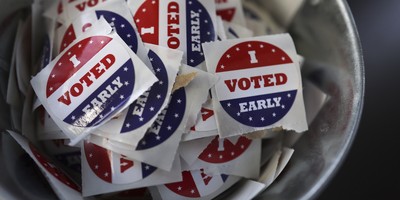WASHINGTON -- As the presidential election of 2012 grinds into gear, President Obama is already behind.
To be safe, a president needs a Gallup job approval of 50 percent or better on Election Day. George W. Bush narrowly won re-election in 2004 with a 48 percent Gallup approval, mainly because his voters were more motivated than John Kerry's. After a long, slow slide, Obama's approval hovers in the low 40s. He starts with ground to make up.
Lacking the momentum of an economic recovery, the Obama campaign is signaling three elements of a political recovery strategy.
First -- 32 months after his inauguration, 28 months after the unemployment rate first surged past 9 percent -- Obama will propose a "very specific" jobs package. In September. Following a well-deserved vacation.
Specificity would be welcome. This is different, however, from timeliness or seriousness. And the proposals currently gaining trial-balloon status are late and weak.
During his Midwest bus tour, Obama talked of extending the payroll tax holiday, creating an infrastructure bank to fund new projects, patent reform and finalizing trade agreements. The extension of payroll tax relief would literally do nothing new -- continuing an existing policy. The infrastructure bank would require significant new spending by Congress as it simultaneously makes difficult, dramatic cuts in discretionary spending. Even in this unlikely event, it is hard to imagine how tens of billions of dollars devoted to roads and bridges -- funneled to less-than-shovel-ready projects and focused on a single distressed industry -- would dramatically succeed in boosting job creation where an $800 billion stimulus package did not. Both patent reform and trade agreements are good ideas with little short-term effect on job creation.
Recommended
Obama may be preparing unexpected policy wonders at Martha's Vineyard, but he cannot change the fact that he made a bad bet. In 2009, he assumed that a staggering economy would recover in a normal cyclical fashion, just in time for his re-election. So he spent his political capital on the largely irrelevant issue of health care. Now he wants to become the jobs candidate, mainly through the repetition of the word "jobs."
The second element of Obama's recovery strategy is to distance himself from a divided, dysfunctional, unpopular Congress. This, of course, is not fully consistent with element one -- getting legislative achievements out of an institution you are savaging. These attacks are not new or, so far, successful. The debt limit debacle was punctuated by the president's irritable complaints about Congress -- particularly about its refusal to raise taxes. Congress responded with complaints about the president's late and erratic interventions -- then pretty much ignored him in crafting a final deal. Americans justifiably held the entire political class responsible. A president cannot distance himself from a process he is supposed to lead and failed to lead effectively.
Third, the Obama camp has previewed a campaign of personal attacks against their Republican opponent, whomever it happens to be. Obama advisers and Democratic strategists have been quoted by Politico calling Mitt Romney "weird," possessing an "innate phoniness," which will allow Democrats to "kill" his campaign. David Axelrod, Obama's chief strategist, has distanced himself from these comments. But such hardball is consistent with the way Obama has treated Speaker John Boehner (going to his home state of Ohio in 2010 to attack him directly) and Rep. Paul Ryan (inviting Ryan to a budget speech in which Obama trashed him as an enemy of children with Down syndrome). As president, Obama has been comfortable practicing the Chicago way of politics. And Texas Gov. Rick Perry now offers a target so tempting that even Democrats outside Chicago will find it hard to resist.
Obama's cause is far from hopeless. His support has declined but not collapsed. A weak Republican opponent would help. And this emerging strategy -- proposing symbolic measures on jobs, bashing an unpopular Congress and discrediting rivals -- may be Obama's only option. A campaign taking credit for positive economic accomplishments would be nearly silent.
For voters, however, this prospect is daunting. Obama's least attractive public attributes are his peevishness and blame shifting. Do we really have to endure a presidential campaign based on those traits?
And this strategy must be a comedown for at least some of the idealists who elected Obama in the first place. Following expectations few presidents have raised as high, Obama has transformed into the most typical of politicians. There is little distinctive, elevated or inspirational about his message or his tactics. And this adds an unwanted accomplishment: the further political disillusionment of a nation.

























Join the conversation as a VIP Member